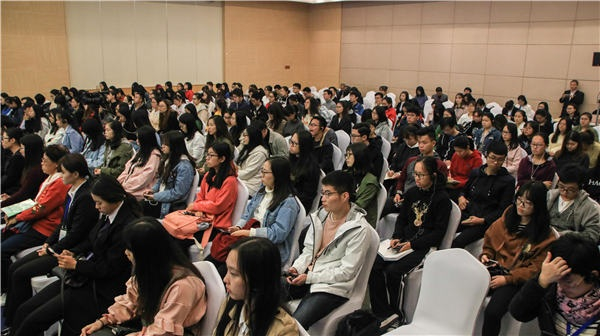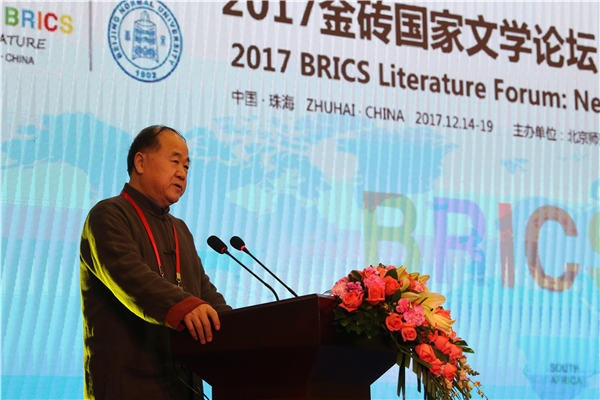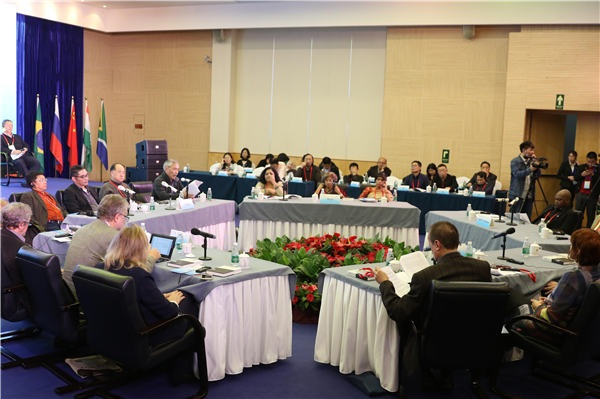Nobel Prize laureate Mo Yan makes the keynote speech at the opening ceremony of 2017 BRICS Literature Forum in Zhuhai, Guangdong province, Dec 15. [Photo provided to chinadaily.com.cn]
Following the fruitful BRICS National Summit held in Xiamen, Fujian province in September, South China was greeted by another international cultural gathering last week (Dec. 14-19, 2017) in Zhuhai of Guangdong province, marking a big step toward literary communication among the BRICS nations of Brazil, Russia, India, China and South Africa.
Taking place on the Zhuhai campus of Beijing Normal University, the forum invited nearly 40 writers and scholars from all five BRICS countries to share their voices and inspire new thinking on the future of both domestic and world literature.
New era, new experience, new vision
In the keynote speech by novelist Mo Yan, the Nobel Prize laureate proposed a new vision for world literature that centers on its unadorned appeal to humanity.
"Our world has witnessed a lot of transformations in the past four decades. Old experiences and understandings were overturned. But puzzles just seem to keep coming. It's the calling of every generation of writers to figure out a new way of writing."
Mo then quoted his late friend Shi Tiesheng, a renowned Chinese novelist with a paralysis of both legs, that "infinity is created in our minds. Only by looking into our hearts can we truly find a new perspective, a new story."
Jidi Majia, vice-chairman of the Chinese Writers Association, added a layer of cultural significance to the cooperation among BRICS countries. "BRICS, which represents great vitality and a bright future, has made its name in the global community," he said.
"Regular communication should penetrate various aspects of our nations, especially for cultural exchanges. As President Xi once said, we should 'create a community of shared future for mankind.'"
Translation fosters transnational literature
To enhance cross-cultural literary exchanges, translation and translator must build bridges overcoming language barriers. Joao Cezar de Castro Rocha, president of the Brazilian Association of Comparative Literature, placed the task of translating at the center of transnational literatures.
"Translators' work goes across cultures and literatures," Rocha said. "For instance, two Brazilian writers, Machado de Assis and Haroldo de Campos, introduced many Chinese traditional poems to Brazilian readers based upon translations from other languages. I think this is a key element in transnational literatures."
Writers and academics from BRICS nations exchange ideas at the 2017 BRICS Literature Forum in Zhuhai, Guangdong province, Dec 15. [Photo provided to chinadaily.com.cn]
He also suggested that fostering transnational literary works calls for major investments in a translation networks consisting of writers, poets, and translators. "Let us offer more space and possibilities for our different experiences, so together we can create a brave new world."
Current imbalances and challenges
Novelist Han Shaogong commented upon challenges in the development of world literature, such as the lack of extensive influence of works written in minority languages and the imbalance of translation talent among different countries. He proposed the notion of "multiple globalization of literature" where all cultures are engaged.
Yuri Mikhailovich Polyakov, chief editor of Literature, an influential Russian journal, analyzed this phenomenon from a Russian perspective and pointed out some difficulties of introducing Chinese literature into Russia, including the limited number of Chinese experts in Russia. "Translation is a tough mission. We need people who comprehend Chinese culture and Chinese literary criticism very well to complete this task. But there aren't enough experts in Russia to do that."
He introduced how current Russian translations of Chinese literature place great importance on award-winning and mostly contemporary works. "I think Chinese literary classics, those have been passed down for generations, deserve more attention from translators and readers in Russia."
Professor Zhang Jianhua from Beijing Foreign Studies University mentioned a rising trend in literature between China and Russia. The two countries have accelerated the pace of exchanges among writers and works since the implementation of the Chinese and Russian literature translation project in 2013. "This forum proves our cooperation will be more frequent and dynamic," Zhang said.

Students of Beijing Normal University, Zhuhai (BNUZ) listen to the lectures at the 2017 BRICS Literature Forum in Zhuhai, Guangdong province, Dec 17. [Photo provided to chinadaily.com.cn]
A brave new world
Indian poet Sukrita Paul Jumar expressed that literature demonstrates the consciousness of contemporary society, making its exchanges even more important. "Bridges through translations must be built for greater understanding amongst people on different linguistic territories within the same country, amongst BRICS countries in particular, and the world in general."
South African writer and journalist Niq Mhlongo saw this event as an opportunity to reform the world with humanitarianism. Literature, according to him, helps society heal from the historical wounds of segregation. He described how a new generation of African writers are emerging in South Africa. Their works have won prestigious prizes like the Berlin Literature Prize (Berliner Literaturpreis).
"It is a matter of pride that we, the BRICS nations, have gathered here to share ideas and philosophies on literature and culture," said Pratishtha Singh, an Indian writer and poet. She interpreted the forum's theme "new era" as referring to the concept of inclusion in all spheres of life.
"In the glorious land of Confucius, with thousands of years of wisdom and knowledge, I feel that great civilizations like the Chinese can show the path of harmonious inclusion to the world," Singh said during her speech.



















